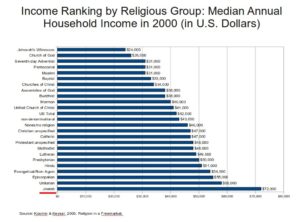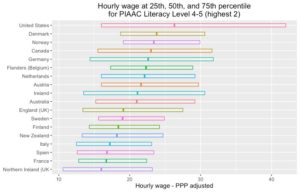You never hear about that. You hear about how women supposedly earn 79c on the dollar to what men earn in similar jobs. You hear about how whites out-earn blacks. But you never hear about the Jewish-Gentile wage gap.
I suspect that people, on average, earn in line with their IQ. The average Ashkenazi IQ is between 108 to 120, while the average East Asian IQ is 105, white IQ is 100, latino IQ is 90 and African-American IQ is 85.
In 2015, average hourly wages for black and Hispanic men were $15 and $14, respectively, compared with $21 for white men. Only the hourly earnings of Asian men ($24) outpaced those of white men.
Among women across all races and ethnicities, hourly earnings lag behind those of white men and men in their own racial or ethnic group. But the hourly earnings of Asian and white women ($18 and $17, respectively) are higher than those of black and Hispanic women ($13 and $12, respectively) – and also higher than those of black and Hispanic men.
From the Jewish Women’s Archive:
This fall, the Jewish Communal Service Association and the Berman Jewish Policy Archive published the results of a study that found that although women comprise two thirds of Jewish communal professionals, their salaries significantly trail those of their male counterparts by an average of $20,000 per year (when adjusted for age, experience, education and other factors).
When The Forward published a report revealing the individual salaries of top Jewish communal leaders, editor Jane Eisner wrote about the findings: “…The gap between male and female salaries among Jewish executives did grow smaller from 2008 to 2009, but women still earned only 67 cents to every dollar earned by men. The median salary for men was $316,074; for women it was $213,855.”
It is true that women, on average, earn 79 cents for every dollar that a man earns. But this figure does absolutely nothing to account for factors such as type of career, number of hours worked or work experience. When you take these factors into account, the gender pay gap shrinks dramatically. Although a gap still exists, there is no evidence that it is caused by discrimination, as opposed to other factors such as women’s relative unwillingness to negotiate for higher pay.
From Inequality.org: “In 2005, the typical white household held seven times more wealth than the typical Hispanic household and 11 times more than the typical African American household. In 2009, these gaps stood around twice as wide, 18 times between white and Hispanic households, 20 times between white and black.”
The portion of the earnings difference between men and women that remains after correcting for occupation, hours worked, etc., is normally considered to be a (perhaps minimal) measure of the extent of discrimination. But, as the author points out, it could be due to other differences between men and women that are not measured in the data.
Is this plausible? One way to check is to look at some of the other earnings gaps out there.
There is a large earnings gap in the US between Jews and non-Jews. If you use exactly the same methodology to correct for occupation, experience, etc., the gap that remains is much larger than the male-female gap.
“Compared with non-Jews, Jewish men have 16 percent higher earnings (other things the same), a 20 percent higher rate of return from schooling, and a steeper experience – earnings profile. These patterns persist even after controlling for occupation, self employment status, and geographic concentration in the New York area.”
(Just to be clear, the comparison is between male Jews and male non-Jews.)
So, if you believe the unexplained part of the male female earnings gap is proof of discrimination, then the unexplained part of the Jewish – non Jewish gap has to be discrimination as well. After all, we used exactly the same statistical methods to derive the numbers.
So is there a nationwide “Jewish patriarchy” that suppresses gentile earnings? Or is it an unmeasured difference in cultural or genetic factors that accounts for the difference?
At this point we simply can not tell if either or both of these gaps are due to discrimination. Maybe the gender gap is all about discrimination and the Jewish gap is all about culture, or vice-versa, or a bit of both. We just don’t know.
From the 1983 paper, “The Earnings and Human Capital of American Jews”:
Jews have nearly 15 percent higher weekly earnings than British-origin non-Jews.. An extra year of schooling raises the weekly earnings of
non-Jews by 6.5 percent and of Jews by 8.3 percent, and the 1.8 percentage point difference is highly significant (t = 5.23). Jews have experience-earnings profiles with significantly steeper slopes. Evaluated at 10 years of experience, an extra year of labor market experience raises the weekly earnings of non-Jews by 1.4 percent and of Jews by 2.1 percent. Evaluated at the mean level of schooling of Jews, Jews with no labor market experience have weekly earnings 1.4 percent lower than non-Jews with no experience, they have the same earnings after one year of experience, and Jews have increasingly higher relative earnings for the next 30 years of labor market experience…Jews still have higher earnings (2.0 percentage points), and a steeper experience-earnings profile (by 0.07 percentage points when evaluated
at T = 10).The occupational distribution of Jews differs from that of the rest of the population. In the data under study, 27 percent of the Jews are in professional occupations, compared with 15 percent of the non-Jews, and the Jews are relatively more represented in medicine and law (Table 4). The Jews are also more likely to be nonfarm managers (27 percent compared with 13 percent) and in sales occupations (20 percent compared with 7 percent). On the other hand, only 18 percent of the Jews compared with 56 percent of the non-Jews are in blue-collar occupations (craft, operatives, transportation, laborers, farmers, service). Jews also are more likely to be self-employed. In these data, 32 percent of the Jews are self-employed compared with 14 percent of the non-Jews…
Why do American Jews appear to have higher rates of return on human
capital? It seems reasonable to assume that labor market discrimination in favor of Jews is not the explanation. The higher rates of return may arise from cultural characteristics that enable Jews to acquire more units of human capital per dollar of investment. For example, Jews may learn more in school or on the job because of supplemental training received in the home or in the Jewish community prior to or concurrent with schooling.28 Or, it may be that there are cultural characteristics that enable Jews to be more productive in the labor market with the human capital embodied in them. The reasons for ethnic group differences in rates of return on human capital warrant further study.


